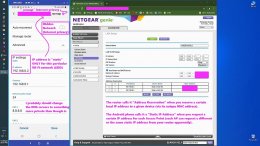Andy Burnelli
2023-03-07 20:23:19 UTC
For Bluetooth and/or Wi-Fi, does Windows have the capability for...
1. MAC randomization *when scanning*
2. MAC randomization *per access point*
3. MAC randomization *per connection*
4. Did I miss any critical timer periods?
BACKGROUND:
The motherships (Apple & Google & Samsung at least) are starting to be
aware of the privacy flaws inherent in having a permanent MAC address.
So they're sloooooooooowly providing, release by release, the inherent
capability to randomize your MAC address during those three tasks.
This article back in 2014, shows the danger of NOT randomizing Wi-Fi:
"When scanning for wireless networks, client devices like the
iPhone periodically broadcast identifying packets that include
the MAC address. In recent years, a number of firms have taken
advantage of these broadcasts to track individual devices as
they move around - for example, some retail outlets use MAC
address-based tracking to record the path that consumers take
as they move through the store, allowing long-term measurement
of shopping habits and better placement of sale materials
and advertising."�
<https://appleinsider.com/articles/14/06/09/mac-address-randomization-joins-apples-heap-of-ios-8-privacy-improvements>
And, this line in that same article shows the dangers with Bluetooth:
"The city of Houston's TranStar traffic monitoring system,
for instance, uses the MAC addresses from Bluetooth devices
to measure traffic flow on city streets."
The question I'm asking for this Windows newsgroup is whether Microsoft has
added this capability to randomize the Bluetooth & Wi-Fi MAC during 3 times
a. When scanning
b. When connecting (per access point)
c. When connecting (per connection)
An example of these types of settings on other platforms might be this:
<Loading Image... > Random MAC on every connect
> Random MAC on every connect
Although it has implications for your home router LAN setup for static IPs.
<Loading Image... > Static/Reserved IP address
> Static/Reserved IP address
1. MAC randomization *when scanning*
2. MAC randomization *per access point*
3. MAC randomization *per connection*
4. Did I miss any critical timer periods?
BACKGROUND:
The motherships (Apple & Google & Samsung at least) are starting to be
aware of the privacy flaws inherent in having a permanent MAC address.
So they're sloooooooooowly providing, release by release, the inherent
capability to randomize your MAC address during those three tasks.
This article back in 2014, shows the danger of NOT randomizing Wi-Fi:
"When scanning for wireless networks, client devices like the
iPhone periodically broadcast identifying packets that include
the MAC address. In recent years, a number of firms have taken
advantage of these broadcasts to track individual devices as
they move around - for example, some retail outlets use MAC
address-based tracking to record the path that consumers take
as they move through the store, allowing long-term measurement
of shopping habits and better placement of sale materials
and advertising."�
<https://appleinsider.com/articles/14/06/09/mac-address-randomization-joins-apples-heap-of-ios-8-privacy-improvements>
And, this line in that same article shows the dangers with Bluetooth:
"The city of Houston's TranStar traffic monitoring system,
for instance, uses the MAC addresses from Bluetooth devices
to measure traffic flow on city streets."
The question I'm asking for this Windows newsgroup is whether Microsoft has
added this capability to randomize the Bluetooth & Wi-Fi MAC during 3 times
a. When scanning
b. When connecting (per access point)
c. When connecting (per connection)
An example of these types of settings on other platforms might be this:
<Loading Image...
Although it has implications for your home router LAN setup for static IPs.
<Loading Image...
--
Posted out of the goodness of my heart to disseminate useful information
which, in this case, is to try to learn about Windows MAC randomization.
Posted out of the goodness of my heart to disseminate useful information
which, in this case, is to try to learn about Windows MAC randomization.